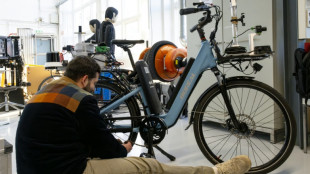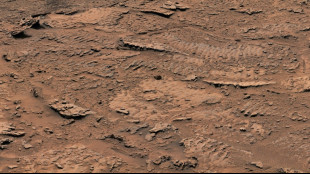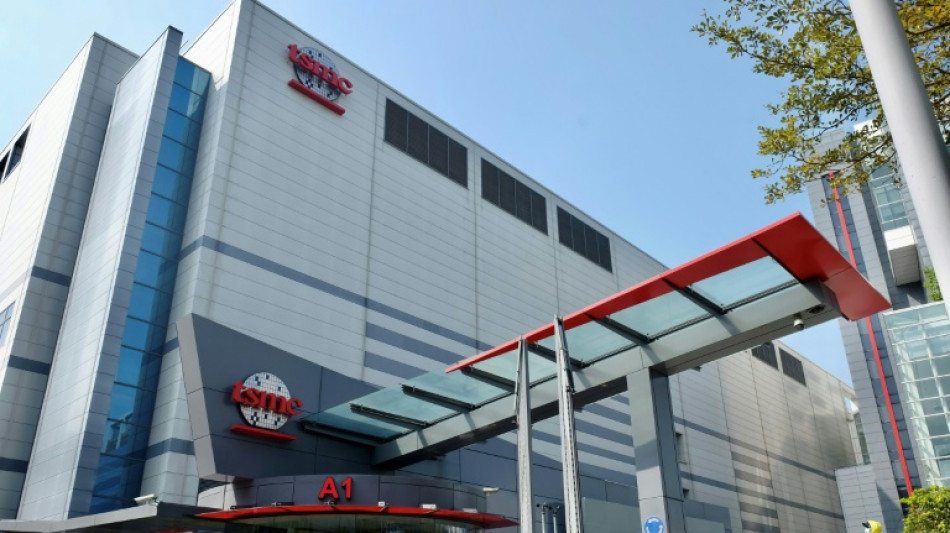
-
 US falling behind on wind power, think tank warns
US falling behind on wind power, think tank warns
-
US news giant CNN eyes 200 job cuts, streaming overhaul

-
 Rubio chooses Central America for first trip amid Panama Canal pressure
Rubio chooses Central America for first trip amid Panama Canal pressure
-
Wall Street's AI-fuelled rally falters, oil slumps

-
 Trump tells Davos elites: produce in US or pay tariffs
Trump tells Davos elites: produce in US or pay tariffs
-
Progressive politics and nepo 'babies': five Oscar takeaways

-
 American Airlines shares fall on lackluster 2025 profit outlook
American Airlines shares fall on lackluster 2025 profit outlook
-
France to introduce new sex education guidelines in schools

-
 Wall Street's AI-fuelled rally falters
Wall Street's AI-fuelled rally falters
-
Drinking water in many French cities contaminated: study

-
 After Musk gesture, activists project 'Heil' on Tesla plant
After Musk gesture, activists project 'Heil' on Tesla plant
-
ICC prosecutor seeks arrest of Taliban leaders over persecution of women

-
 Syria's economy reborn after being freed from Assad
Syria's economy reborn after being freed from Assad
-
Shoppers unaware as Roman tower lurks under French supermarket

-
 Stocks mainly rise after Wall Street's AI-fuelled rally
Stocks mainly rise after Wall Street's AI-fuelled rally
-
Singer Chris Brown sues Warner Bros for $500 mn over documentary
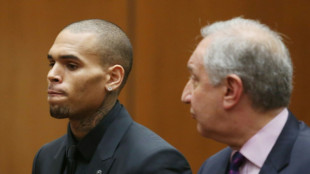
-
 J-pop star Nakai to retire after sexual misconduct allegations
J-pop star Nakai to retire after sexual misconduct allegations
-
Leaky, crowded and hot: Louvre boss slams her own museum

-
 WWF blasts Sweden, Finland over logging practices
WWF blasts Sweden, Finland over logging practices
-
How things stand in China-US trade tensions with Trump 2.0

-
 Most Asian markets rise after Wall Street's AI-fuelled rally
Most Asian markets rise after Wall Street's AI-fuelled rally
-
Fire-hit Hollywood awaits Oscar nominees, with 'Emilia Perez' in front

-
 New rider in town: Somalia's first woman equestrian turns heads
New rider in town: Somalia's first woman equestrian turns heads
-
Most Asian markets extend AI-fuelled rally

-
 Bangladesh student revolutionaries' dreams dented by joblessness
Bangladesh student revolutionaries' dreams dented by joblessness
-
Larry Ellison, tech's original maverick, makes Trump era return

-
 Political crisis hits South Korea growth: central bank
Political crisis hits South Korea growth: central bank
-
Photonis Launches Two Market-Leading Solutions to Advance Single Photon Detection and Imaging Applications
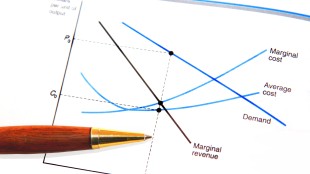
-
 Les Paul owned by guitar god Jeff Beck auctioned for over £1 mn
Les Paul owned by guitar god Jeff Beck auctioned for over £1 mn
-
Musk bashes Trump-backed AI mega project

-
 Does China control the Panama Canal, as Trump claims?
Does China control the Panama Canal, as Trump claims?
-
Yemen's Huthis say freed detained ship's crew after Gaza truce

-
 Mel B, Trump and Milei: What happened at Davos Wednesday
Mel B, Trump and Milei: What happened at Davos Wednesday
-
Argentina's Milei says would leave Mercosur for US trade deal

-
 Fashion world 'afraid' of Trump, says Van Beirendonck
Fashion world 'afraid' of Trump, says Van Beirendonck
-
P&G sees China improvement but consumers 'still struggling'

-
 Stock markets mostly higher as they track Trump plans, earnings
Stock markets mostly higher as they track Trump plans, earnings
-
Anti-Semitic acts at 'historic' highs in France despite 2024 fall: council

-
 Trump's meme coin venture sparks backlash
Trump's meme coin venture sparks backlash
-
Global green energy push likely to continue despite Trump climate retreat: UN

-
 Prince Harry settles lawsuit against Murdoch's UK tabloids
Prince Harry settles lawsuit against Murdoch's UK tabloids
-
Stock markets diverge tracking Trump plans

-
 Sudan 'political' banknote switch causes cash crunch
Sudan 'political' banknote switch causes cash crunch
-
Masa Son, Trump's Japanese buddy with the Midas Touch

-
 Borussia Dortmund sack coach Nuri Sahin after Champions League setback
Borussia Dortmund sack coach Nuri Sahin after Champions League setback
-
'Love for humanity': Low-crime Japan's unpaid parole officers

-
 Brazil saw 79% jump in area burned by fires in 2024: monitor
Brazil saw 79% jump in area burned by fires in 2024: monitor
-
No home, no insurance: The double hit from Los Angeles fires

-
 Tamkeen Launches ‘Bahrain Skills and Gender Parity Accelerator’ at Davos
Tamkeen Launches ‘Bahrain Skills and Gender Parity Accelerator’ at Davos
-
ZeroPath Corp. Launches Next-Generation Code Security Platform Powered by Artificial Intelligence


Taiwan's TSMC stops shipments to client after chips sent to Huawei
Taiwanese chipmaking giant TSMC halted shipments to a customer this month after its semiconductors were sent to China's Huawei, a Taipei government official told AFP, potentially breaching US sanctions.
Taiwan Semiconductor Manufacturing Company is the world's largest contract manufacturer of chips used in everything from Apple iPhones to Nvidia's cutting-edge artificial intelligence hardware.
Huawei, the world's leading equipment maker for fifth generation mobile internet networks, has been embroiled in a tech war between Beijing and Washington.
The United States slapped sanctions on Huawei in 2019, and expanded them the following year, over fears its technology could be used for Beijing's espionage operations. Huawei denies the allegations.
The sanctions cut Huawei off from global supply chains that gave it access to the US-made components and technologies crucial to manufacturing powerful AI systems.
The restrictions prevent TSMC from selling semiconductors to Huawei.
But, TSMC discovered on October 11 that chips made for a "specific customer" had ended up with the Chinese company, a Taiwanese official with knowledge of the incident told AFP on the condition of anonymity.
TSMC "immediately activated its export control procedures", halting shipments to the customer and "proactively" notifying US and Taiwan authorities, the official said.
In a statement on Wednesday, TSMC said it was a "law-abiding company" and had not supplied Huawei since mid-September 2020 in compliance with export controls.
"We proactively communicated with the US Commerce Department regarding the matter in the report," TSMC said, apparently referring to media reporting of the incident.
"We are not aware of TSMC being the subject of any investigation at this time."
Taiwan's economic ministry told AFP on Thursday that TSMC had informed them about the incident, but had not identified their client.
"There was already an interaction and a contractual partnership in place, so it's an old client," the ministry said.
They had been a client since before the 2020 deadline for companies to comply with the export controls, and "no shipments have been made since October 11", it said.
- Self-sufficiency -
Bloomberg reported Tuesday that Canadian research firm TechInsights had found an advanced processor made by TSMC inside Huawei's latest AI chip.
Huawei did not respond to AFP's request for comment.
The company told Bloomberg that it hadn't "produced any chips via TSMC after the implementation of the amendments made by the US Department of Commerce" to its trade restrictions targeting Huawei in 2020.
In response to US export restrictions, Beijing has turbo-charged a drive for self-sufficiency in chips, with plans to pump billions of dollars into the sector.
Huawei last year unveiled the Mate 60 Pro, a high-performance smartphone equipped with a chip that experts say would be impossible to produce without foreign technologies.
That sparked debate about whether attempts to curb China's technological advancements have been effective.
P.Kolisnyk--CPN

